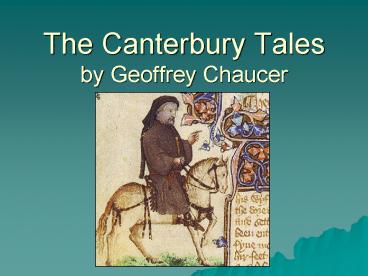The Canterbury Tales by Geoffrey Chaucer - PowerPoint PPT Presentation
1 / 13
Title:
The Canterbury Tales by Geoffrey Chaucer
Description:
The Canterbury Tales by Geoffrey Chaucer Background of these tales Geoffrey Chaucer wrote this story in the late 1300 s but never finished it. – PowerPoint PPT presentation
Number of Views:132
Avg rating:3.0/5.0
Title: The Canterbury Tales by Geoffrey Chaucer
1
The Canterbury Talesby Geoffrey Chaucer
2
Background of these tales
- Geoffrey Chaucer wrote this story in the late
1300s but never finished it. - He wrote in the native language or vernacular of
the Medieval period in Britain called Middle
English.
3
The Story
- Twenty nine people that represent all aspects of
Medieval society go on a pilgrimage to the
cathedral at Canterbury in southeast England.
4
- The cathedral at Canterbury is the main cathedral
of the Church of England. The shrine to the
martyr Saint Thomas a Becket is located at this
cathedral.
5
The story format
- Chaucers characters are going to pay respects to
this shrine as a part of a religious pilgrimage.
They all meet at a tavern to begin their journey.
6
- Saint Thomas a Becket was the archbishop of
Canterbury, and in 1170 he was martyred by some
knights of the king of England, Henry II, who
was overheard complaining about Beckets loyalty
to the church at Rome over his loyalty to his
king.
7
Some of the characters
- The host of the tavern or innkeeper is the man
who suggests that the pilgrims each tell a story
on the way to entertain the group. Chaucer
intended for each to tell 2 stories, but he only
got to write one apiece.
8
The following characters are the wife of Bath and
the pardoner,
9
The following characters are the priest and the
miller
10
And two more familiar characters are the knight
and his squire
11
Format of the poetry
- The Canterbury Tales are called a frame story,
meaning that there are many stories framed in
the larger story of the pilgrimage to Canterbury.
12
1 Whan that aprill with his shoures soote 2
The droghte of march hath perced to the roote,
3 And bathed every veyne in swich licour 4 Of
which vertu engendred is 8 Hath in the ram his
halve cours yronne, 9 And smale foweles maken
melodye, 10 That slepen al the nyght with open
ye 11 (so priketh hem nature in hir corages)
12 Thanne longen folk to goon on pilgrimages,
13 And palmeres for to seken straunge strondes,
14 To ferne halwes, kowthe in sondry londes
15 And specially from every shires ende 16 Of
engelond to caunterbury they wende, 17 The
hooly blisful martir for to seke, 18 That hem
hath holpen whan that they were seeke. 19 Bifil
that in that seson on a day, 20 In southwerk at
the tabard as I lay 21 Redy to wenden on my
pilgrymage 22 To caunterbury with ful devout
corage, 23 At nyght was come into that
hostelrye 24 Wel nyne and twenty in a
compaignye, 25 Of sondry folk, by aventure
yfalle 26 In felaweshipe, and pilgrimes were
they alle, 27 That toward caunterbury wolden
ryde.
13
- Whan that Aprill with his shoures soote
When April with its
sweet-smelling showers2 The droghte of
March hath perced to the roote,
Has pierced the drought of March to the
root,3 And bathed every veyne in swich
licour And bathed every vein (of
the plants) in such liquid4 Of which
vertu engendred is the flour By
which power the flower is created5 Whan
Zephirus eek with his sweete breeth
When the West Wind also with its sweet
breath,6 Inspired hath in every holt and
heeth In every wood and field
has breathed life into 7 The tendre
croppes, and the yonge sonne The
tender new leaves, and the young sun8
Hath in the Ram his half cours yronne,
Has run half its course in Aries,9
And smale foweles maken melodye,
And small fowls make melody,10 That
slepen al the nyght with open ye
Those that sleep all the night with open eyes11
(So priketh hem Nature in hir corages),
(So Nature incites them in their
hearts),12 Thanne longen folk to goon on
pilgrimages, Then folk long to
go on pilgrimages,13 And palmeres for to
seken straunge strondes, And
professional pilgrims to seek foreign shores,14
To ferne halwes, kowthe in sondry
londes To distant shrines,
known in various lands15 And specially
from every shires ende And
specially from every shire's end16 Of
Engelond to Caunterbury they wende,
Of England to Canterbury they travel,17
The hooly blisful martir for to seke,
To seek the holy blessed martyr,18
That hem hath holpen whan that they were
seeke. Who helped them when they
were sick.































